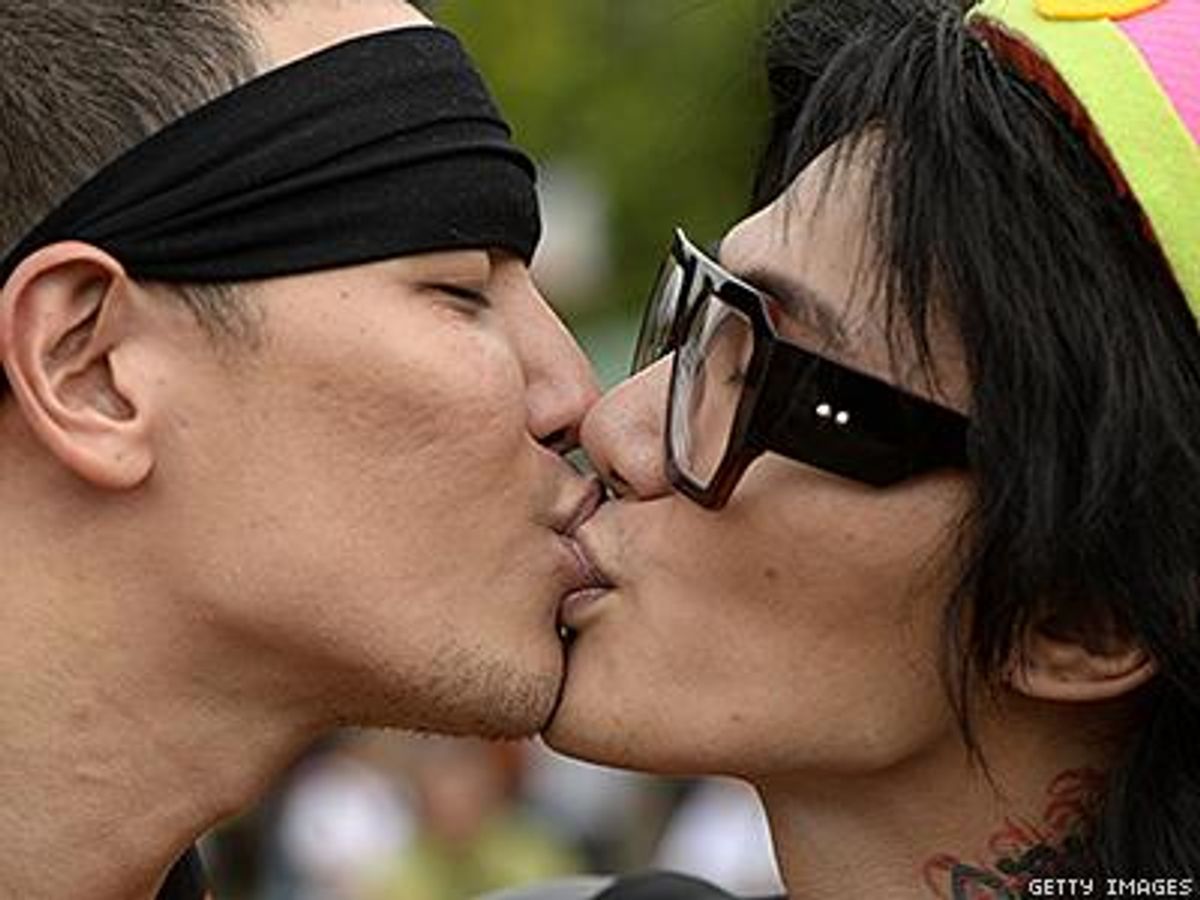The decision happened here but there is joy "over there," as LGBT people around the world celebrate the U.S. Supreme Court's ruling in favor of marriage equality.
The victory was on the minds of many of the thousands of people in Ireland, who turned out for Dublin's first LGBTQ Pride Parade since last month's landmark landslide referendum. Ireland was the first nation in the world to approve same sex marriage by popular vote.
"We led the way on gay marriage," said out Irish Senator David Norris, who added that it was "wonderful to see the Supreme Court ruling yesterday."
"I think its becoming too fashionable," he joked to the Irish Times. " I think I'll come out as straight!"
Same-sex marriage is legal in several western European countries including France, Spain and throughout Great Britain except for one province: Northern Ireland. A judge in Belfast gave the go-ahead Friday to a lesbian couple seeking to overturn a ban on same sex marriage in that British-controlled land.
In Australia, the issue is so contentious, Prime Minister Tony Abbott, a longtime opponent of marriage equality, parsed his words so carefully in an interview with News24, responding to a question about the U.S. decision, that he completely avoided any mention of the words "marriage equality," "lesbian," "gay," "bisexual," "transgender," or even the acronym "LGBT."
"I haven't had a chance to study it. But look, what happens in the United States is obviously a matter for the United States, just as what happened in Ireland a few weeks ago is a matter for the Irish. As for our own country, obviously there's a community debate going on. I have views on this subject which are pretty well-known, and they haven't changed."
Education Minister Christopher Pyne told 9News Australia the issue would probably return to Parliament after the winter break.
"When we come back in spring there's every possibility that will be back on the agenda," he said, adding that a vote should be held this year.
One supporter in Australia's legislature said the landmark ruling in the U.S. is the loudest call yet for marriage equality in her country.
"We clearly have some catching up to do here," Senator Janet Rice said in a statement.
Tweets from down under expressed a similar sentiment, some using the hashtag #TonyAbbottDoesNotSpeakForMe to show their support for marriage equality and opposition to Abbott.
Same sex marriage is legal in South Africa, Brazil and Canada. However, being gay is at least considered taboo and in many countries illegal in many parts of Africa and Asia.
Several hundred gays, lesbians and transgender people turned their Gay Pride rally in the Philippine capital of Manila Saturday into a victory celebration, in hopes of boosting their own cause, and to push for their own LGBT rights.
About 500 people carrying signs and streamers saying "Fight for Love" and waving rainbow banners marched around Rizal Park. Some brought along pets dressed in rainbow costumes.
Jonas Bagas, executive director of the pro-LGBT rights group TLF Share, said the U.S. ruling "will reverberate in other corners of the world."
Bagas said that in the predominantly Roman Catholic Philippines, where the church fiercely opposes gay marriages along with divorce and artificial contraceptives, he expects the "conservative majority" to continue to block human rights for LGBT people.
"We hope that after this decision, the struggle for equality can be reframed to go beyond marriage equality so that we can address other dehumanizing situations that LGBTs encounter," he said.
Sylvia Estrada Claudio, a gender rights advocate and professor of women development studies at the University of the Philippines, called the decision "a triumph for feminism" because of the "intimate connections" between discrimination based on biological gender and discrimination based on sexual orientation, gender identity and expression.
"I can't help but note that the three women justices voted for marriage equality, forming a solid core in what was a close vote," she said.
Same-sex unions are not legally recognized in the Philippines because the country's civil code limits marriages to a man and a woman.
A gay Filipino lawyer, Jesus Nicardo Falcis III, has challenged the constitutionality of the civil code provision on marriage, saying that the constitution does not define marriage solely as between a man and a woman and that the family code itself does not require a married couple to have children or the ability to procreate.
The U.S. decision "touches the very heart of same-sex relationships: that now you can marry and live with the one you love, your union protected by the legal mantle of the state," said Danton Remoto, chairman of the LGBT Party List in the Philippines.
Archbishop Socrates Villegas, president of the Catholic Bishops Conference of the Philippines, said in a statement that the church will continue teaching that marriage "is an indissoluble bond of man and woman." He said, however, that the church won't discriminate against LGBTs.
The church will study the U.S. court's decision "with assiduousness, and revisit our concepts and presuppositions, always with an eye to being faithful to the Gospel and to the mission of the Church," Villegas said.
Watch how Irish parade goers describe their feelings about the U.S. Supreme Court decision and watch a time lapse of Dublin's Pride Parade, below. And below that, hear for yourself how Australia's antigay marriage Prime Minister reacted to news of marriage equality in the United States.













































































